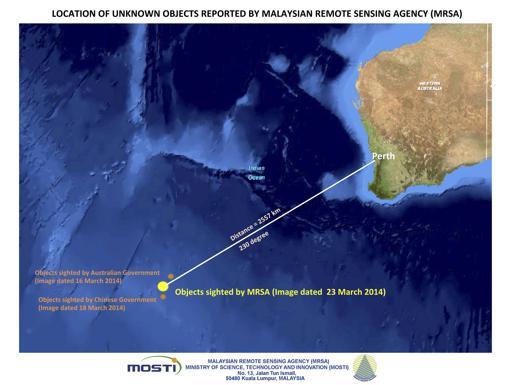PERTH/KUALA LUMPUR - New satellite images have revealed more than 100 objects in the southern Indian Ocean that could be debris from a Malaysian jetliner missing for 18 days, while planes scouring the frigid seas on Wednesday also reported seeing potential wreckage.
The latest sightings came as searchers stepped up efforts to find some trace of Malaysia Airlines Flight MH370, thought to have crashed on March 8 with the loss of all 239 people aboard after flying thousands of miles off course.
"We have now had four separate satellite leads, from Australia, China and France, showing possible debris," Malaysian Acting Transport Minister Hishammuddin Hussein told a news conference. "It is now imperative that we link the debris to MH370."
The latest images were captured by France-based Airbus Defence & Space on Monday and showed 122 potential objects in a 400-sq-km (155-sq-mile) area of ocean, Hishammuddin said. The objects varied in size from one metre to 23 metres (75 ft) in length, he said.
Flight MH370 vanished from civilian radar screens less than an hour after taking off from Kuala Lumpur bound for Beijing, and investigators believe someone on the flight may have shut off the plane's communications systems.
Partial military radar tracking showed it turning west and recrossing the Malay Peninsula, apparently under the control of a skilled pilot.
Malaysia's air force has released few details of its radar tracking beyond saying the plane was last detected off the northwest coast heading towards India.
But the country's deputy defence minister, Abdul Rahim Bakri, told parliament that no action was taken when the unidentified plane was spotted because it was assumed it had been ordered to turn back, local media said.
"It was detected by our radar, but the turn back was by a non-hostile plane and we thought maybe it was at the directive of the control tower," he was quoted as saying.
Asked at the news conference whether air force radar operators thought the plane had been told to turn back by air traffic controllers, Hishammuddin, who is also defence minister, said he could not confirm it.
Middle of nowhere
A dozen aircraft from Australia, the United States, New Zealand, China, Japan and South Korea were once more scouring the seas some 2,500 km (1,550 miles) southwest of Perth in the hunt for wreckage on Wednesday, after bad weather the previous day forced the suspension of the search.
"The crash zone is as close to nowhere as it's possible to be but it's closer to Australia than anywhere else," Australian Prime Minister Tony Abbott said, before leading the country's parliament in a moment's silence.
"A considerable amount of debris has been sighted in the area where the flight was last recorded. Bad weather and inaccessibility have so far prevented any of it from being recovered. But we are confident that it will be."
Wednesday's good weather was unlikely to last, in an area renowned among mariners for high winds and big waves.
"This is only going to be a narrow window of opportunity by the looks of things, because another weather system is moving in for Thursday, which looks like that will bring an increase in winds again and also lead to a reduction in visibility through the rain associated with the cold front," Neil Bennett, a spokesman for Australia's Bureau of Meteorology, told Reuters.
Malaysian Prime Minister Najib Razak this week confirmed Flight MH370 had crashed in the southern Indian Ocean.
Citing satellite-data analysis by British company Inmarsat , he said there was no doubt the Boeing 777 came down in one of the most remote places on Earth.
Recovery of wreckage could unlock clues about why and how the plane had diverted so far off course in one of aviation's most puzzling mysteries. Theories range from a hijacking to sabotage or a possible suicide by one of the pilots, but investigators have not ruled out technical problems.
Australia, China and France have all released satellite images over the past week showing possible debris in the same general area as the latest sighting, but no confirmed wreckage has been located.
Passenger relatives distraught
An Australian navy ship returned to the area after being driven away by gale force winds and 20-metre (66 ft) waves on Tuesday, while a Chinese icebreaker and three Chinese navy vessels were also in the search zone.
Two Chinese ships were looking for a two-metre floating object spotted earlier in the day by an aircraft, China's state news agency Xinhua reported.
The United States has sent an undersea Navy drone and a high-tech black box detector which will be fitted to an Australian Defence vessel due in Perth in the coming days.
The so-called black boxes - the cockpit voice recorder and flight data recorder - record what happens during flight, but time is running out to pick up locator beacons that stop about a month after a crash due to limited battery life.
Malaysia said on Tuesday that the U.S. "Towed Pinger Locator" would not arrive in the search area until April 5, which would give it only a few days to find the black box before the beacon battery would be expected to run out.
The prolonged and so far fruitless search and investigation have taken a toll, with dozens of distraught relatives of Chinese passengers clashing with police in Beijing on Tuesday, accusing Malaysia of "delays and deception".
Malaysia's confused initial response to the plane's disappearance and a perception of poor communications have enraged many relatives of the more than 150 Chinese passengers and have strained ties between Beijing and Kuala Lumpur.
Chinese special envoy Zhang Yesui met Malaysia's Najib on Wednesday and called for "unremitting efforts" to find the plane, Xinhua said.






















































